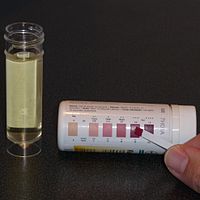
Photo from wikipedia
Objectives To assess parental preventive behaviour related to children related to the coronavirus disease-2019. Method The descriptive-analytical, cross-sectional study was conducted from November to December 2021 in Kalirungkut, Surabaya, Indonesia,… Click to show full abstract
Objectives To assess parental preventive behaviour related to children related to the coronavirus disease-2019. Method The descriptive-analytical, cross-sectional study was conducted from November to December 2021 in Kalirungkut, Surabaya, Indonesia, after approval from the ethics review committee of the Faculty of Nursing, Universitas Airlangga, Surabaya. The sample comprised parents of children aged <5. Data was collected using the Indonesian version of the Champion's Health Belief Model Scale questionnaire. RESULTS Of the 125 subjects, 57(45.6%) were mothers and 68(54.4%) were fathers. Majority 63(50.3%) were aged 26-35 years, 82(85.6%) had completed senior high school, and 64(51.2%) had 2 children. Perceived susceptibility (p=0.044, rho=0.181), perceived severity (p=0.000, rho=0.363), perceived benefits (p=0.036, rho = 0.188), cues to action (p=0.018, rho=0.211) and self-efficacy (p=0.000, rho=0.345) were significantly related to parental behaviour, while perceived barrier was not significantly related (p=0.094, rho=-0.150). CONCLUSIONS All factors in the Health Belief Model were found to be related to parental preventive behaviour except perceived barriers.
Journal Title: JPMA. The Journal of the Pakistan Medical Association
Year Published: 2023
Link to full text (if available)
Share on Social Media: Sign Up to like & get
recommendations!